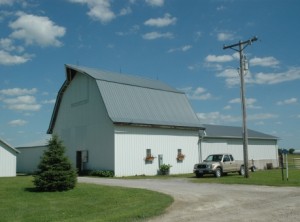July 17th, 2009
By Barbara Kessler
Green Right Now
If you’re looking for the small, family farm, you can find it in
history books. Or in Iowa. Amid the oceans of corn and hogs being raised
by giant industrial concerns is a small but tenacious under-current of
small farmers determined to make it on 60 acres, give or take,
 on
their own terms.
on
their own terms.
These small business owners (they’re not just in Iowa of course) are gambling that America’s taste for organic and naturally grown vegetables, grains and meats will sustain them as they revive trusted old methods, (like enriching the soil with natural compost), and incorporate technology that fits with their humane, sustainable model.
There’s hope on the horizon for these mavericks: Consumer demand for natural products is soaring. Organic agricultural production, despite more than doubling in the last decade, can barely keep up. Groceries and schools are increasingly looking for local food sources.
Phil and Marjorie Forbes, with part-time help from both their parents, are one farm family trying restore the land to feed this growing market. We talked with Phil during a visit to central Iowa, where he’s been farming outside of Kalona since the 1998.
He explained how he’s created a system of inter-connected parts, designed to work together and assure the well-being of the farm. He uses Percheron draft horses, for instance, because they “force me to think smaller.” Sheep are a big part of the operation because they produce wool for prized natural yarns, and also lambs for meat, and they (along with the horses and the heritage chickens) eat grass, which is grown on the farm.
This new paradigm takes the conventional wisdom that’s grown up around farming as it evolved in the past 50 years — believing that bigger was always better, pesticides were necessary and focus on main crop was helpful and the final product was sold on the commodities market — and discards it, or turns it on its upside down.
“Weeds here indicate ‘poor farming’ (to conventional farmers) but to me they indicate an opportunity for sheep to graze a lot,” says Forbes, who grew up in Oregon, but moved to Iowa in the 1990s to begin a career in farming. Weeds also create “edge” which gives his farm a border of wild prairie and shelter that houses wildlife, wildflowers and beneficial insects.
It’s not assembly line, says Forbes, who sells his veggies to the New Pioneer Food Coop in Iowa City and his eggs to neighbors. Nor is the idea that this must be back-breaking yeoman’s labor. Working with horses can be “hard work,” Forbes admits. But the goal is to have everything humming toward the same ends, toward soil that is enriched year after year by the animals that graze the pasture; and biodiversity that’s enhanced by crop rotation, livestock variety and a tolerance of all insects, bad and good.
With the right systems in place, a farm can be a manageable, profitable enterprise.
“I keep thinking ‘less work’,” says Forbes, 46, who gets part-time help from his parents and his father-in-law who grew up farming with horses in an Amish community. Forbes himself still works a day job at a nearby natural creamery, but he’s proud that his farm is sustainable, profitable and organic. “It’s better for the land. It’s better for the people.”
Copyright © 2009 Green Right Now | Distributed by Noofangle Media